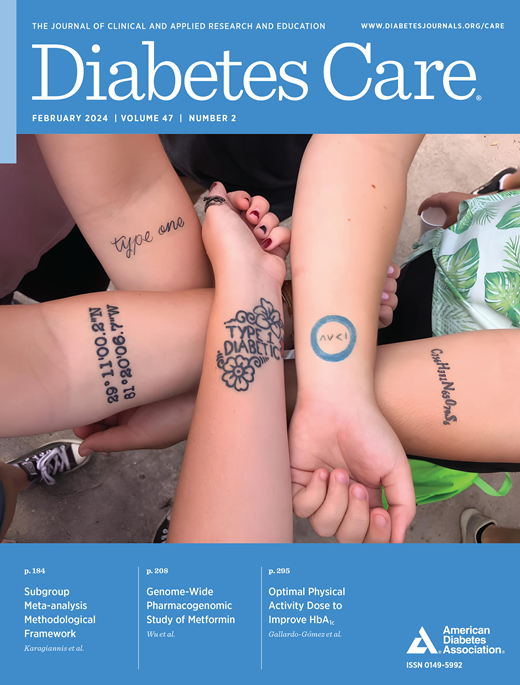Energy Restriction, Weight Loss, Glycemia, and Breastfeeding Outcomes in Gestational Diabetes: A DiGest Trial Secondary Analysis
IF 16.6
1区 医学
Q1 ENDOCRINOLOGY & METABOLISM
引用次数: 0
Abstract
OBJECTIVE We aimed to assess whether energy restriction, weight loss, or maternal glycemia in late pregnancy were associated with breastfeeding outcomes. RESEARCH DESIGN AND METHODS This is a secondary analysis of the Dietary Intervention in Gestational Diabetes (DiGest) randomized controlled trial, which included 425 participants with gestational diabetes who were randomly assigned to receive a standard-energy (2,000 kcal/day) or reduced-energy (1,200 kcal/day) diet box from 29 weeks until delivery, with masked continuous glucose monitoring. Breastfeeding intentions and outcomes were documented (n = 304 of 425) and analyzed using regression models. RESULTS Energy restriction in late pregnancy did not affect breastfeeding outcomes. Achieving ≥90% time in range (3.5–6.7 mmol/L; 63–120 mg/dL) with a low glycemic variability (coefficient of variation and SD), but not weight loss, were associated with any breastfeeding at 3 months postnatally. CONCLUSIONS Improved late pregnancy glycemia and decreased glucose variability, but not weight loss or energy restriction, were associated with breastfeeding after gestational diabetes.妊娠期糖尿病的能量限制、体重减轻、血糖和母乳喂养结局:一项消化试验的二次分析
目的:我们旨在评估妊娠后期能量限制、体重减轻或母体血糖是否与母乳喂养结局相关。研究设计和方法:这是对妊娠糖尿病饮食干预(DiGest)随机对照试验的二次分析,该试验包括425名妊娠糖尿病患者,从29周到分娩,随机分配接受标准能量(2000千卡/天)或降低能量(1200千卡/天)的饮食盒,并持续监测血糖。记录母乳喂养意图和结果(n = 304 / 425),并使用回归模型进行分析。结果妊娠后期能量限制不影响母乳喂养结局。达到≥90%的时间范围(3.5-6.7 mmol/L;63-120 mg/dL),低血糖变异性(变异系数和标准差),但体重减轻,与出生后3个月的任何母乳喂养有关。结论:妊娠糖尿病后母乳喂养与妊娠晚期血糖改善和血糖变异性降低有关,但与体重减轻或能量限制无关。
本文章由计算机程序翻译,如有差异,请以英文原文为准。
求助全文
约1分钟内获得全文
求助全文
来源期刊

Diabetes Care
医学-内分泌学与代谢
CiteScore
27.80
自引率
4.90%
发文量
449
审稿时长
1 months
期刊介绍:
The journal's overarching mission can be captured by the simple word "Care," reflecting its commitment to enhancing patient well-being. Diabetes Care aims to support better patient care by addressing the comprehensive needs of healthcare professionals dedicated to managing diabetes.
Diabetes Care serves as a valuable resource for healthcare practitioners, aiming to advance knowledge, foster research, and improve diabetes management. The journal publishes original research across various categories, including Clinical Care, Education, Nutrition, Psychosocial Research, Epidemiology, Health Services Research, Emerging Treatments and Technologies, Pathophysiology, Complications, and Cardiovascular and Metabolic Risk. Additionally, Diabetes Care features ADA statements, consensus reports, review articles, letters to the editor, and health/medical news, appealing to a diverse audience of physicians, researchers, psychologists, educators, and other healthcare professionals.
 求助内容:
求助内容: 应助结果提醒方式:
应助结果提醒方式:


